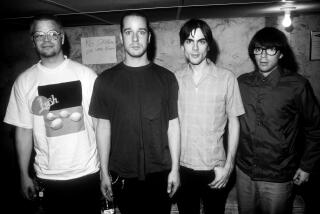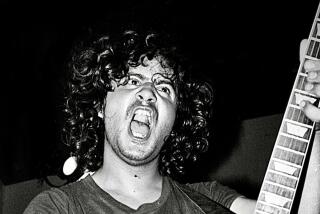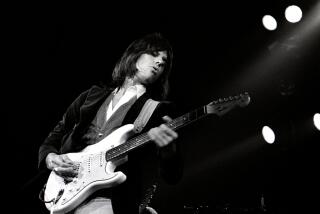MICHAEL BRECKER’S BLESSED EVENT
- Share via
In these days of overnight stardom and overblown hype, it is noteworthy that Michael Brecker, a professional musician for 17 years, has just given birth to his first album as a leader.
True, there have been several Brecker Brothers recordings with Randy Brecker on trumpet, and six LPs with the group Steps Ahead, which he co-led with Mike Mainieri; but the new release simply titled “Michael Brecker” (MCA/Impulse 5980) finds him heading his own all-star quintet.
“I waited a long time to do this,” said the 38-year-old saxophonist, “because I never really felt ready. I wanted to make a record that would represent a departure from Steps Ahead, with more of a straight-ahead jazz feeling to it. And Impulse (Records) seemed like the right place to do it, because that label, with all those great albums by John Coltrane and Sonny Rollins, had just the right image for what I had in mind.”
Brecker’s own image has been confused. For years he lived a double life, working lucratively in the studios with everyone from Chick Corea and Dire Straits to Bette Midler and Bruce Springsteen, yet maintaining an in-person reputation with his brother, with Mainieri, and not long ago on a European tour with John Abercrombie. He still works now and then with Randy, who is three years his senior. In the 1970s both brothers worked with Dreams, with Horace Silver and with Billy Cobham. “We were together off and on for so long that it got to a point where we needed to find more of our separate identities; I think this has worked out well for us both.”
Even while his own album is being promoted, Brecker is competing with himself. He can be heard on two important cuts on the new Patrick Williams LP (Soundwings) and on a recent release by Eddie Gomez (Columbia). But the eponymous “Michael Brecker” set represents him best.
“Charlie Haden was the first person I called for my date. He’s a phenomenal bassist, with an almost telepathic gift. And Pat Metheny in a way is similar to Charlie; he has that great lyric sense on guitar, and a strong personality that transcends the instrument.
“To complete the group I had Jack De Johnette, a drummer who is totally musical and swings amazingly; and Kenny Kirkland, who was with Wynton Marsalis and Sting, and who right now is my favorite pianist in every respect: I love his solos, his harmonic concept, and his section playing. Kenny’s working it out so he can continue working with Branford Marsalis and with my group.”
In the album, Brecker shifts gears between his jazz identity on tenor and two tracks in which he plays the EWI, the electronic wind instrument synthesizer. Referring to it as the “ee-wee,” Brecker says: “It’s a fascinating instrument. It has the saxophone fingering, and on the EWI itself only one note comes out, but I had it interface with other synthesizers so I could produce several notes at once.” This polyphonic effect produces startling results on a cut called “Original Rays.” “Because it’s triggered by air, it can sound different according to who plays it. I won’t say it gets as distinctive a sound as the saxophone, though, and after playing an electronic instrument for a while I do get tired; I feel the need to go back and vibrate the sax reed.”
It was during his Steps Ahead days that Brecker discovered the EWI. “Steps Ahead began informally at Seventh Avenue South, a club that Randy and I owned from 1977-85. Mainieri called me and the drummer, Steve Gadd, to come in and play there: A Japanese producer was in the audience one night and invited us to work in Tokyo. Steps Ahead is on hold at the moment, because I’m involved in my own project, and Mike is busy building a studio in New York. But we still hope to do some more touring and recording next year.”
For all his infatuation with the synthesized sounds of the EWI (which he says he will use more extensively on his next album), Brecker is deeply conscious that his roots go back to such acoustic idols as John Coltrane.
“I was lucky enough to hear Coltrane in person just once before he died. He played a concert in Philadelphia, with his wife Alice on piano. I’ll never forget that experience--and thank God there’s such a wide collection of reissues coming out now on CDs.
“I listened to so much Coltrane for so long that I finally realized the need to go back and delve into Charlie Parker, Miles and all the others who had preceded him: Clifford Brown, Louis Armstrong and an endless list of blues guitarists--Albert King, B.B. King, Jimi Hendrix.
“I always advise students to listen to people like Coltrane, Rollins, Joe Henderson, and even to copy their solos as a learning tool--I did that myself with some of Trane’s solos, note for note--but only as one step in learning a language, before you go on to speak in your own voice.”
Visiting schools to offer instruction at clinics, Brecker has found that too often the young musician tends to emulate his own style without taking the trouble to examine its sources. “Young players simply have to go back into history and listen to the best of what was created on every instrument.”
Typically, Brecker has had to make some substitutions for the all-star cast heard on his album, yet the personnel for his road tour shows admirable strength.
“Kenny Kirkland is still with me, but the rest of the ensemble is different. I’m happy to have Mike Stern on guitar. My bassist, Jeff Andrews, was with Special EFX, and he’s a great young up-and-comer; then I have a fine drummer, Adam Nussbaum.
“We make it a point to re-create everything on the album, live, and it’s worked wonderfully so far. We played Fat Tuesday’s in New York, some gigs in New England, and a week in Japan. We’ll be in Los Angeles May 21 to work at the Palace. Later we’ll be doing a lot of the big jazz festivals, from New York to Nice.”
Despite all the work he has lined up for his group, Brecker does not plan to lose contact with the studio scene that has served him so well for so long. “I’ve just about done it all, from dates with Diana Ross and Sinatra to John Lennon and Julian Lennon,” he says, “but I still spend about half my time in New York, and if I get a call for a date I’ll usually be happy to do it.
“I did get sort of nailed as just a studio musician, but of course I have to turn some of that work down nowadays in order to be able to go out and play. But I feel lucky I can still have the best of both worlds.”
More to Read
The biggest entertainment stories
Get our big stories about Hollywood, film, television, music, arts, culture and more right in your inbox as soon as they publish.
You may occasionally receive promotional content from the Los Angeles Times.










